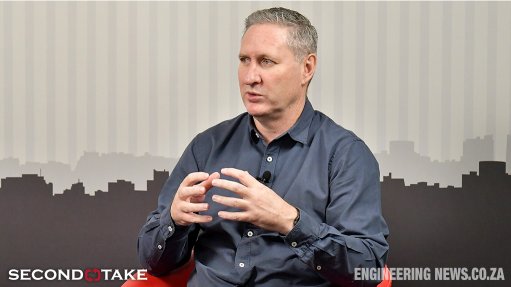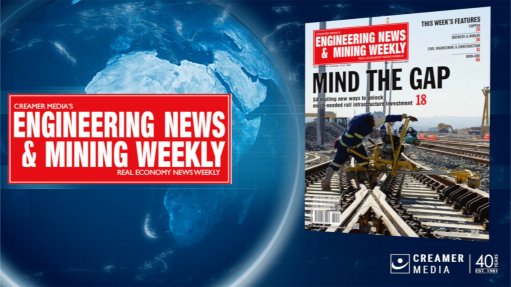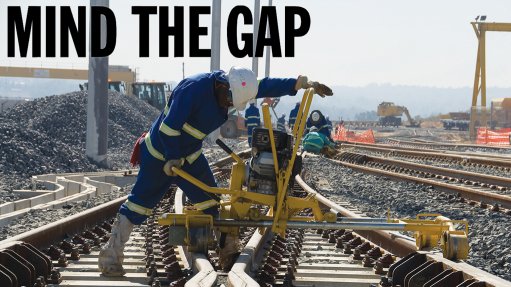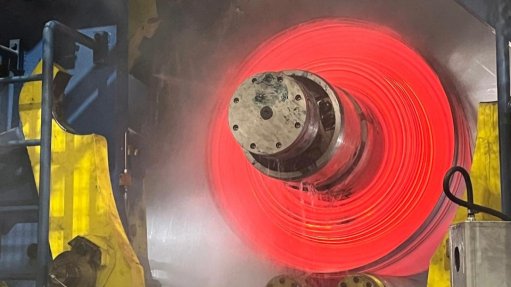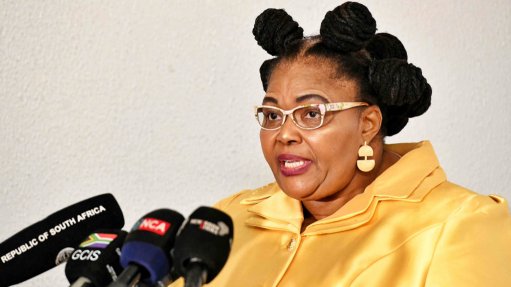- Home
- Loadshedding
- Latest News
- Sector News
- Back
- Agriculture
- Automotive
- Chemicals
- Construction
- Defence & Aerospace
- Economy
- Electricity
- Energy
- Environmental
- Manufacturing
- Back
- Manufacturing Home
- Capital Equipment
- Chemicals & Pharmaceuticals
- Clothing & Textiles
- Food & Beverage
- Foundries, Forges & Die-Casting
- Furniture & Wood products
- Hydraulics
- Industrial Filters & Filtration
- Instrumentation & Control
- Manufacturing
- Metals & Engineering
- Paper, Plastics, Packaging, Printing
- Pipes & Tubes
- Pumps
- Rubber
- Valves
- Welding & Cutting
- Metals
- Mining
- Renewable Energy
- Services
- Technology & Communications
- Trade
- Transport & Logistics
- Water
- Magazine
- Back
- This Week
- Back Copies
- Cartoon
- Business Leader
- Company Profiles
- Features Library
- Back
- Features Library Home
- Aerospace
- Energy in Africa
- Agricultural Engineering
- Air, Gas, Fumes & Dust Control
- Aluminium
- Automation & Industry 4.0
- Automotive Assembly in Africa
- Automotive Components
- Automotive Industry
- Battery Energy Storage
- Bearings & Bushes
- Biofuels
- Boilers & Burners
- Brewery & Winery
- Building the Hydrogen Economy
- Business Conferences
- Business in Africa
- Business in KwaZulu-Natal
- Business Success Stories
- Capital Equipment in Construction
- Cement & Concrete
- Chemicals & Petrochemicals
- Civil Engineering & Construction
- Climate Change
- Commercial & Industrial Property
- Compressors, Air Motors & Vacuum Pumps
- Construction
- Construction Materials & Equipment
- Consulting Engineers
- COP
- Corrosion Control, Coatings & Tribology
- Cranes & Hoists
- Creamer Media Virtual Showroom
- Decarbonisation Solutions & Technologies
- Defence
- Drones
- Education & Training
- Electric Power Generation & Transmission
- Electrification & Distribution
- Embedded Electricity Solutions
- Energy Efficiency & Management
- Energy Transition
- Eskom
- Fasteners
- Fire Prevention & Protection
- Flooring Industry
- Food & Beverage
- Foundries, Forges & Die-Casting
- Freight Rail Infrastructure
- Furnaces, Kilns, Ovens & Dryers
- Gas
- Gas-to-Power
- Generators & Standby Power
- Green Building & Industries
- Hand-Held & Power Tools
- Harbour & Offshore Services
- Harbour Infrastructure & Dredging
- Health & Safety
- Heavy Lifting & Abnormal Loads
- HVAC-R
- Hydraulics & Pneumatics
- IFAT Africa
- Industrial & Commercial Lighting
- Industrial Filters & Filtration
- Instrumentation & Control
- Laser Technology
- Light Steel Frame Building & Roofing
- Locomotives, Railway Trucks & Wagons
- Machine Tools
- Maintenance & Refurbishment
- Manufacturing
- Materials Handling & Logistics
- Medical & Pharmaceutical Engineering
- Metalworking & Fabrication
- Motors, Drives & Mechanical Power Transmission
- Municipal Infrastructure & Services
- NAACAM
- Noise, Vibration & NDT
- Nuclear Industry
- Oil Refineries & Fuel Storage
- Oils & Lubricants
- Packaging, Labelling & Barcoding
- Paper, Pulp & Board
- Personal Protective Equipment
- Plastics, Packaging & Printing
- Pipes, Tubes & Hoses
- Enlit Africa Preview
- Project Management
- Pumps
- Rail Transport & Infrastructure
- Roads & Bridges
- Rubber Manufacturing & Products
- SA Institute of Steel Construction
- SA Institute of Welding
- SACEEC
- Sasol
- Seals, Gaskets & Sealing Mechanisms
- Sewage & Effluent
- Solar Energy
- German Contribution to the Southern African Econom
- South Africa Infrastructure Outlook
- South-Africa Italy Partnership
- Stainless Steel & Ferrochrome
- Steel
- Steel Construction & Cladding
- Sugar Growers, Millers & Refiners
- Sustainable Infrastructure Development Systems
- Testing, Inspection & Certification Services
- Top Projects: Renewable Energy Projects
- Top Projects: Transport & Logistics
- Top Projects: Tswhane Automotive SEZ
- Top Projects: Water & Sanitation
- Transport Month
- Truck, Trailer, Bus & Bakkie
- Valves
- Vessels, Heat Exchangers, Tanks & Containers
- Warehousing & Storage
- Waste Management, Recycling & the Circular Economy
- Water Engineering, Infrastructure & Reservoirs
- Water Treatment, Purification & Desalination
- Water Week
- South Africa’s Energy Outlook
- Welding & Cutting
- Wind Energy
- Women in Industry
- Working at Height
- Agricultural Technology
- Youth in Industry & Mining
- Hydrogen, Fuel Cells & The Green Economy
- Supplements
- Video Reports
- Audio
- Research
- Press Office
- Back
- All Companies
- AfriSam
- Alcohol Breathalysers
- ASP Fire
- AutoX
- Bearings International
- BMG
- Consort Technical Underwriting Managers
- Constructional Engineering Association
- Engen
- Fuchs Lubricants
- Integrated Pump Rental (IPR)
- Integrated Pump Technology
- ITALCHAM
- NCPC (National Cleaner Production Centre)
- Pilot Crushtec
- Rifle-Shot Performance Holdings
- Schneider Electric
- SKF Group
- SMS group
- SRK Consulting
- Syspro
- Trafo Power Solutions
- WEG
- Weir Minerals Africa
- Announcements
- Virtual Showroom
- Login
- Columnists
- What's On
- Jobs
- Topics
- Apps
- Product Portal
- Made in South Africa
- Webinars
- About Us
- Legal Notice
- Comment Guidelines
- Marketing Videos
- Live Twitter Feed
Note: Search is limited to the most recent 250 articles. To access earlier articles, click Advanced Search and set an earlier date range.
To search for a term containing the '&' symbol, click Advanced Search and use the 'search headings' and/or 'in first paragraph' options.
Sponsored by
Saliem Fakir
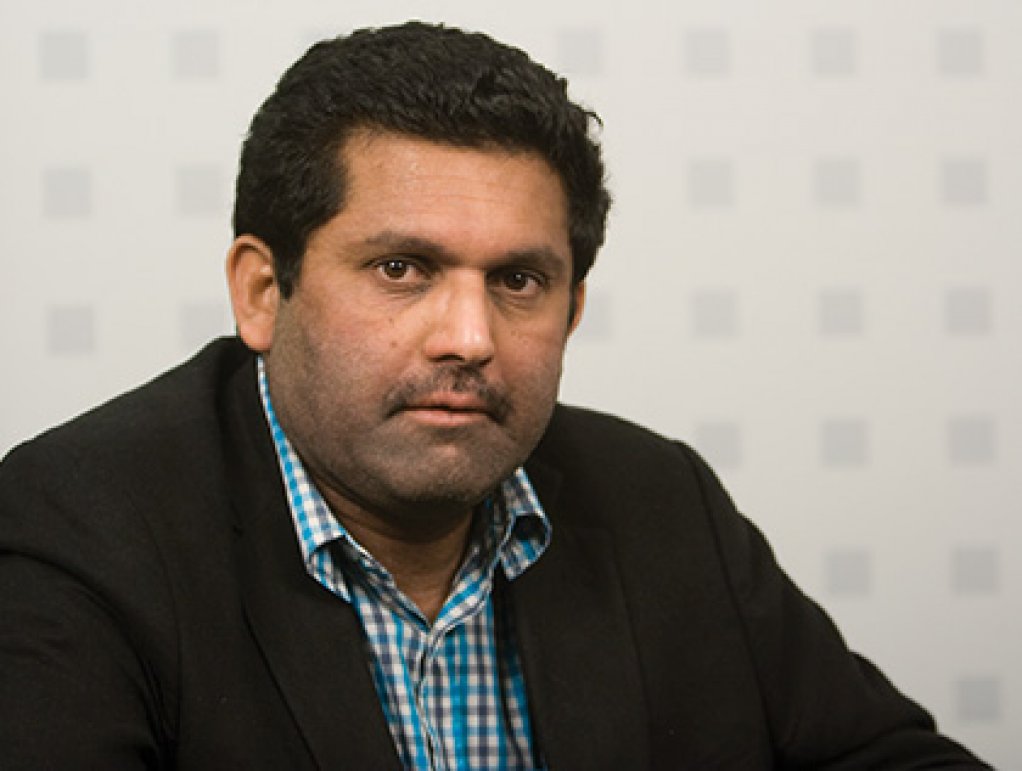
Fakir is interim executive director of the African Climate Foundation – saliem@africanclimatefoundation.org
Rigging the nuclear outcome?
15th December 2017 At the time of writing, it appeared nuclear would be ramped through before the African National Congress elective conference, which starts on December 16. New Energy Minister David Mahlobo says we need nuclear. There have been a lot of platitudes about jobs and industrialisation, and that nuclear... →
Inside the green economy
10th November 2017 It is often assumed that the green economy only relates to a specific type of technology or shifts in energy demand. The notion of the green economy has been in existence in South Africa for a long time. Conceptually, the green economy notion gained prominence in South Africa after 2007 and many... →
New era of disruption
20th October 2017 Perhaps the recent multiple attacks of extreme weather – hurricanes Harvey, Irma and Maria – do not only tell us that fierce weather is the new normal, but changes in weather, together with other global shifts and crises, are forcing us to acknowledge that we are moving into an era of greater... →
Taking the green out of economy
22nd September 2017 There is only one economy, not two. The challenge all societies face today is leaving behind the legacy of an old system. How do we embark on a systems change – a shift from System A to System B? Fundamentally, it is a shift in production and consumption systems. How do we interlink the two to... →
Enviro rights entail more than just the environment
18th August 2017 It is important to review where we have come from over the past 20 years and how much has been achieved in that time. South Africa's Constitution makes provision for environmental protection in its Bill of Rights. This follows a long history of environmental issues not having been treated with... →
Decolonising the green economy
4th August 2017 On June 13, a good agent provocateur, former National Planning Commission member Mike Muller, proposed in a panel discussion at a Trade and Industrial Policy Strategies (TIPS) conference on sustainable growth and industrialisation that we should decolonise the idea of the green economy. Muller... →
Is science losing its authority?
16th June 2017 Scientists have, for a long time, been held in high esteem. Yet scientist struggle to effectively mediate evidenced-based outcomes in highly politicised and contested public policy issues, such as those concerning climate science or whether cellphone cause cancer. The Internet is flattening... →
New vision needed for conservation
26th May 2017 A friend of mine, Mark Halle, argues that the world of conservation is going nowhere and that a new vision is needed to take it out of its maelstrom. I agree and often solutions are not found in defensive postures but in the offensive realm. Three things will determine the future of conservation... →
Political entrepreneurship in the energy sector
5th May 2017 The expediency for rent-seeking that comes with large capital infrastructure projects is always lurking behind the scenes. The extent to which long fingers can grab as much as possible is largely dependent on procurement design and the ability to complete projects on budget. The more the cost... →
What can we tell of Eskom’s future from the Denton report?
3rd March 2017 The debate on the independent power producer (IPP) programme can serve as a useful distraction, and power utility Eskom is exploiting it to the full. The problem is not the IPPs, and they never will be. IPPs are a scapegoat to obfuscate the many long-term multiple challenges Eskom faces, which it... →
Going beyond the Limits to Growth debate
10th February 2017 The Limits to Growth (LTG) thesis was developed in the 1970s by a group of experts collectively called the Club of Rome. They used a computer (at that time, they did not have sufficient data or the computing power that we have today) model to link exponential population growth, income/gross... →
Why the future need not be so bleak
27th January 2017 Sometimes environmental dystopia can obscure progress. As the global climate negotiation process moves along, it is interesting to see how the climate change and fossil fuel debate is beginning to reshape our world. Change may happen faster and more disruptively than we may think. Here is a... →
Climate change in the Donald Trump era
9th December 2016 Donald Trump's Presidency will, no doubt, have a significant impact on the progress on collective action on the climate change front. The US President-elect has promised to rip apart any semblance that climate change is real. It is said that, in Morocco, the incumbent US climate negotiating team,... →
Decolonisation of science – what is it?
11th November 2016 A group of University of Cape Town students organised a panel discussion on the decolonisation of science, which is also another way of saying that science should be Africanised. The YouTube version of the debate went viral, arousing consternation in some quarters and mocking and ridicule in... →
Why technological transitions happen
14th October 2016 Sustainability theorists have generally provided broad and abstract descriptors of technoeconomic transitions, as they are focused on drivers that shift the adoption of new technologies, displacing old ONE. They leave to the imagination the real mechanism and the workings of the political... →
The future is bright for renewables
2nd September 2016 It is hard for people to appreciate the history of renewables if they were not there from the beginning. Renewables started way before the large roll-out we have seen since 2012. Back then, it was a sort of hobby among enthusiasts, academics and experts. In fact, in the late 1970s, South Africa... →
Can Europe survive without Britain?
5th August 2016 The European project has been long in the making, starting with the formation of the European Coal and Steel Community (ECSC), which involved France, Germany, England and others and formally came into being in 1951 with the signing of the Treaty of Paris. Luminaries of the pan-European idea, such... →
What next for environmentalism?
1st July 2016 This question – What's next for environmentalism? – arose from a reflection piece (which is available on the WWF-SA website) that I wrote for the Ecomodernist Manifesto (EM), which was launched in the US last year. The EM was written by 18 experts associated with the Breakthrough Institute, in... →
Realities of modern energy planning
3rd June 2016 Energy technologies involve two realities that influence the way we do our planning: certainty and uncertainty. There is certainty in tried and tested stuff, and this relates to our experience and knowledge of mature technologies. These technologies give us confidence in several regards:... →
We need to create a twenty-first century economy
6th May 2016 We are in an interrugnam, as Marxists would say. We are stuck in a nineteenth- or twentieth-century-type economic model that sits in the way of doing things in South Africa and contrasts with a twenty-first century technology shift and an alternative way to think about modern economies. The... →
Reconceiving South Africa’s water challenge
4th March 2016 There is water and there is no water. A physical resource may be abundant but it is scarce – through waste, poor pricing, inefficient allocation or the inability of human systems to keep up with the latest technologies. A resource may be scarce but it is abundant because more can be done with... →
Time for tough decisions as rand weakness persists
5th February 2016 Many years back, the rand plummeted, reaching its lowest level against the dollar – close to R25 to the US currency. This was around 2001 and prompted the then President Thabo Mbeki to launch a commission of inquiry into the collapse of the rand. Although the commission attributed the currency's... →
What now after COP 21?
22nd January 2016 The year 2015 will go down in history as the hottest on record. Bizarre weather continues to play itself out in front of our eyes. In the US, intense tornadoes, snow storms in Texas and floods in the north of the United Kingdom point to weather patterns going haywire. Down here, we are having one... →
Carbon tax – be careful of future trade measures
4th December 2015 The National Treasury has released a draft Carbon Tax Bill and has invited interested parties to submit comments by the middle of this month. There are design and implementation issues with the tax; however, what is important is not so much the tax but whether an implicit carbon price or tax... →
The hybrid generation system is here to stay
6th November 2015 Schumpeter once wrote: "There is certainly no point in trying to conserve obsolescent industries indefinitely; but there is a point in trying to avoid their coming down with a crash and in attempting to turn a rout into an orderly retreat." This is not about renewables per se, as renewables will... →
COP 21 and South Africa’s position
9th October 2015 South Africa is fourteenth out of the 20 or so worst emitters of greenhouse gases. Today or historically, we account for between 1% and 2% of global emissions. Even though this may be considered small, South Africa’s position as a developing but emerging economy means our leadership and moral... →
The capable State and inclusive economic growth
4th September 2015 The African National Congress's (ANC's) National General Council (NGC) discussion document was released a few weeks ago and makes for an interesting read. This article will focus on the economic transformation chapter. Those who have doubts that the ANC is behind the National Development Plan... →
Carbon tax – some pragmatism is needed
7th August 2015 The furore over the carbon tax that is playing itself out in public and behind closed doors is leading to an impasse. From the submissions made to the Davis Commission (which is reviewing the general tax system), it can be said that industry does not want it and probably never wants to ever see... →
International climate change bargaining disappointing
17th July 2015 Scientific persuasion could not be more compelling than the growing evidence that climate change and variability pose the greatest threat to humanity. But whether collective political action will be taken to solve this challenge remains to be seen. Even the Pope Francis is convinced that... →
Delinking from the minerals sector
3rd July 2015 Minerals and energy resources will continue to play an important role in South Africa’s economy. It is what South Africa does that will determine its future. While we have substantial minerals strategic global value, such as platinum-group minerals, titanium, chrome and manganese, besides others.... →
We should stop building big power plants. Period!
5th June 2015 The current crisis at at power utility Eskom is a result of policy decisions made during and after apartheid. Faulty energy paradigms, political interference and a corporatist mentality have ensured that Eskom has lost its public-good compass. One entity alone has and continues to create systemic... →
Engel’s Curve and the pollution question
3rd April 2015 Pollution remains one of the challenging issues for many emerging economies. They want growth and development before worrying about dealing with the long-term externality problems. There are several sources of the pollution: coal-fired power plants, vehicles, refineries, smelters and cheap, dirty... →
New approach to mining needed
13th March 2015 There is a need for a more holistic view of mining than the current compliance mode of governance. By holistic, one means working on the full virtuous cycle in which depleting valuable resources are used to generate other types of assets and capital formation. The current model for mining has... →
Renewables-related job creation
30th January 2015 Most jobs in renewables are created during installation. This is not different from constructing a soccer stadium or building the next Carlton Centrehere there are foundations to be laid, cement poured and steel pillars to be erected they sort of amount to the same thing in the early phases of... →
What to do about the South African economy
23rd January 2015 Improving the performance of, and labour participation in, the primary sectors of the South African and the manufacturing sector should be priority. We have had massive job losses in the mining sector, a situation that contrasts with the 1970s. The same is true for agriculture, which has been in... →
Denmark’s green technology export thrust
7th November 2014 I was invited by the Danish Embassy in South Africa to undertake a study tour of the Nordic country with fellow South Africans. There were 12 of us from both the public sector and the private sector. We were hosted by an organisation called the State of Green. The main aim of the State of Green... →
South Africa in the Brics – opportunity or a lost cause?
3rd October 2014 The Brazil, Russia, India, China and South Africa (Brics) meeting held in Fortaleza, Brazil, in July, ended with the establishment of the Brics bank, called the New Development Bank, raising not only important questions about the role of the bank but also South Africa’s place in the Brics. What... →
Future urban centres and role of innovative city planning for energy systems
5th September 2014 After a long process of consultation, the Integrated Urban Development Framework (IDUF) has been released for further discussion and debate. The IDUF is a slim document but contains numerous ideas and thoughts on how to take forward the National Development Plan’s objectives of ensuring South... →
Living wages, living allowances and the platinum strike
18th July 2014 Debates on living wages or minimum wages are not unique to South Africa. You will find similar debates in France, the UK and the US following a recession and growing household debt in these countries. Because of the globalisation of the world labour pool, low- and semiskilled workers have been... →
Electricity generation and future prices
4th July 2014 Living with an electricity monopoly mandated to provide basic services is always a double-edged sword. If it is well run and efficient, it can be a boon for consumers and the public in general. If it is run poorly and inefficiently, the aftershocks will hurt consumers' pocket and eat at the tax... →
Four reasons why nuclear is dead beat
30th May 2014 I attended a recent Academy of Science of South Africa (Assaf) conference on nuclear power in Pretoria. It brought to fore the mountain of justification – moral, financial and technical – the nuclear build programme has to climb for it to gain a foothold in our energy mix. For those who were... →
Latest News
Latest Videos
About
Engineering News is a product of Creamer Media.
www.creamermedia.co.za
Other Creamer Media Products include:
Mining WeeklyResearch Channel Africa
Polity
About
Newsletters
Subscriptions
We offer a variety of subscriptions to our Magazine, Website, PDF Reports and our photo library.
Subscriptions are available via the Creamer Media Store.
View storeSubscriptions
Advertise
Advertising on Engineering News is an effective way to build and consolidate a company's profile among clients and prospective clients. Email advertising@creamermedia.co.za
View options






